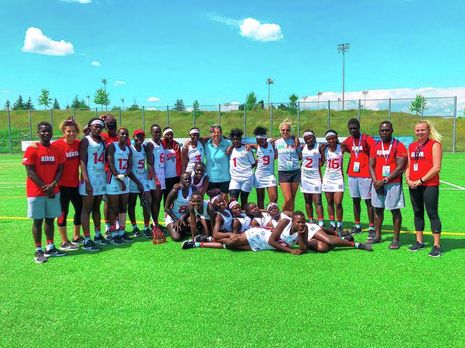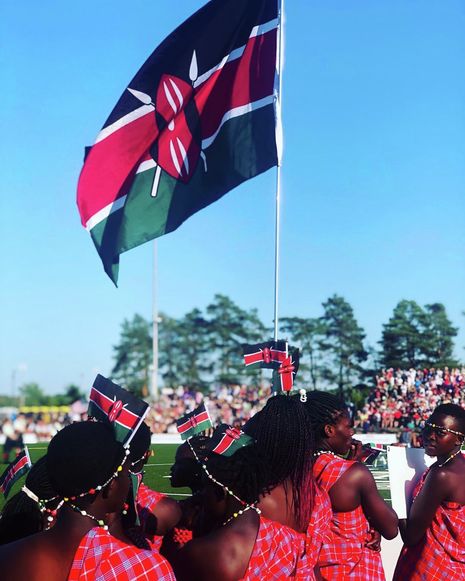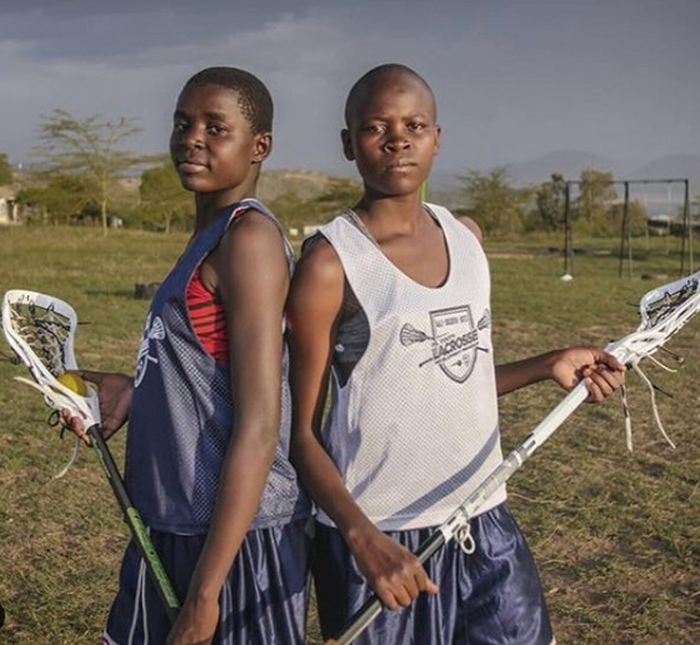“We expected publicity and hype, but to not to such an extent” – catching up with Kenya’s pioneering women’s lacrosse team
In 2019, Kenya’s U19 women’s lacrosse team made history. Finn Ranson caught up with coach and founder of Kenya Lacrosse Storm Trentham after another incredible chapter in the team’s story

In the space of three weeks, Kenya’s U19 women’s lacrosse team went viral after featuring on ESPN’s Twitter, made it onto House of Highlights’ Instagram, and even found themselves put up in the house from Cheaper by the Dozen 2. A music collaboration featuring the girls’ matchday songs might even be in the offing.
It was a pretty glamorous World Championships in Canada last summer – and a successful one, too. Kenya won three of their eight games and lost 7-6 to the eighth seed, Germany, after a last-minute winner; three members of the squad caught the eye of US college coaches. It is a remarkable turnaround from the circumstances in which I last spoke to former Cambridge Lacrosse coach Storm Trentham last February, when the Kenyan government had effectively banned the sport.
“We expected publicity and hype, but to not to such an extent,” Trentham said. “The opening ceremony was a massive eye opener for us. All the teams were desperate to have photos. Even the Canadians, the reigning champions, were queuing up for photos and jumping in for dance lessons.”
By the time the team exited from that opening ceremony – dancing to their bus, of course – hundreds of people were filming them. US Lacrosse tweeted a video that quickly notched 80,000 likes. The girls were all over US Lacrosse Magazine.
“We had people travelling from the UK, Australia and America to watch us play,” said the former Wales international. “One particular club called Janie Lax came from the US for one game with a couple of their young players. They came back three times doing 20 hour round trips purely because they had fallen in love with the girls.” The same club soon after raised over $750 to contribute to the team’s school fees, thanks to a lemonade sale organised by a five-year-old girl.

At each practice match in the build-up, the squad received school equipment, lacrosse t-shirts and caps. Opposition players have since shown their support too. America’s goalkeeper has been in touch with Trentham to discuss sending lacrosse equipment. The family of one Canadian player has offered to sponsor all of the girls’ education, regardless of what year they are in or what arrears they owe. One of the Kenyan girls and Germany’s star player, Bella Herrera, were inseparable for much of the tournament after she marked the German out of the second half of their match. Herrera is now trying to fundraise for Kenya Lacrosse. Such is the effect of the Kenyan Queens, rivals quickly become supporters.
The Kenyan girls continued to be social media dynamite. “On our first day training at the facilities we were lucky enough to join Team Australia and be coached by Jen Adams,” Trentham said. “As we were finishing our session, Israel were heading to the practice pitch after us. They were screaming and chanting because they were like ‘oh my god we’ve been following you on Instagram for months and you’re all like celebrities’,” Trentham laughed.
“I’m glad that everyone around the world had a tiny glimpse into how amazing these girls are on and off the pitch.”
On Day 7 of the tournament, Israel became part of the sensation. A video of them giving each Kenya player cleats ahead of their match went viral and was quickly snapped up by ESPN and House of Highlights. Almost three million watched it.
“They [the Kenya team] got the love and support they deserved,” Trentham said. “I’m glad that everyone around the world had a tiny glimpse into how amazing these girls are on and off the pitch.”
And yet as far as Trentham is concerned nothing has changed.
Scroll down the replies to ESPN’s video and it does not take long to find sharp criticism of the Kenyan government, infamous for chronically failing its athletes. In ironic contrast to Israel’s gesture of goodwill, Kenya’s race walkers were never given any track shoes at the 2016 Olympics because, according to a government report following the Games, Kenyan officials ‘may have stolen them’.
Trentham tells me that she is friends with a few Kenyan track athletes and rugby players. “In the last 3 weeks alone, they’ve been banished from the national team for either publicly standing up for their rights, or because they’re the wrong tribe so the officials in that sport would not gain financially from their appearance money,” Trentham explained. “After the last Varsity article, I was actually contacted by a Kenyan saying I should be careful about what I say about the people of Kenya. I just replied, if they did what was right, I would not have to say a word. He’s never replied.”
These girls’ success is irrevocably tainted by its very Billy-Elliot-ness. It is tainted by the altruism and the exceptional force of will it has depended upon from players, coaches and volunteers because – as Trentham was quick to acknowledge – this is untenable.
“One minute I’m on a high because all this is happening,” she said. “And the next I’m thinking it shouldn’t have to get to this and we can’t rely on these people donating the whole time. We are the only team that did not pay for a penny of our trip.
“As I’ve always said this is not sustainable and it’s up to Kenya now to really sort it out. The fact that we didn’t have one shilling donated by a Kenyan company or the Kenyan government is outrageous and embarrassing.”
Trentham called on corporates Safaricom and Kenya Airways to provide sponsorship. The airliner particularly would be an enormous help in getting the country’s men’s team to the U19 Worlds in Ireland next summer.
“We need some Kenya corporates to see what this is doing for their country, their kids, their education,” she said. “Everyone else can see it.”
“Yes we can get the 18 through school,” she added. “But that’s just the 18. I want this to be sustainable so we are able to change the lives of more than 18 kids. Hundreds should be benefitting from playing lacrosse whether at a recreational or international level but it’s not going to happen unless Kenya step in.”
Even during those heady days in Peterborough, the players’ daily tribulations were never far away. One of Trentham’s girls is an orphan who brings up her siblings.
“I could see this player was having a bad day and so I went to her room to have a chat,” Trentham said. “It transpired that it was the year anniversary of her mother’s death the very next day.
“She also didn’t know whether her contract as a cleaner at a hospital was going to be renewed. Her sister had to go to a dentist while she was away and she didn’t have the money to pay for that. Her uncle was demanding money from her salary and she’d promised her brother she would find the money to send him back to school if he did really well in his exams. He had passed with flying colours yet she had no money to fulfil her promise.”
But something extraordinary happened next – something that never hit the Twitterverse.
Four days after arriving home, the same girl messaged Trentham with a photo of her outside her local orphanage. She was passing on some of the gifts she had received during the World Championships.
“That just sums these girls up. Girls that don’t have much themselves giving things that they do have to others less fortunate.”
“She said she was making sure everyone in the community benefited from her experience in Canada,” Trentham said. “That just sums these girls up. Girls that don’t have much themselves giving things that they do have to others less fortunate.”
Another member of the squad has suffered from malaria three times since Trentham first brought her into the programme – five times in her life.
“When I asked how she received treatment the other two times she was ill, she said ‘I would stay at home for three, four weeks and just drink hot water’,” Trentham explained. “That’s all she can do. When she says home she sleeps on a table with a sheet in a two bedroom mud shack.”
The player went to Canada with an injured anterior cruciate ligament. Anyone who has ever played team sport will know the crushing solitude of sitting out and watching on. But she was always upbeat, Trentham says – save for one day. “I found her in her room in floods of tears,” she described. “She’d been praying to God for the last half an hour for no one else to get injured because she wanted everyone to play every second of every game, unlike her. That’s just such an amazing mindset.
“I’ve known these kids for years and I always think I know them quite well. And then one of the players does that.”
The team were met by press in Nairobi airport when they landed. The next day, they were on KTM, the country’s main news channel. Then it was back to the daily anxieties of school fees and job contracts.
The girls have a Whatsapp group where they reminisce of their time in Peterborough. ‘Three weeks ago today we were there or doing that,’ run the messages.
“These girls have been playing their own parts in a movie,” said Trentham. “Any team gets the blues after a championship, let alone when they’ve come from where they have.”
You could easily be mistaken for thinking otherwise. Trentham shows me a note the injured player slipped into her bag. It is a handwritten thank you letter.
“You guys make me feel valued and make me realise that I have a duty to accomplish in this life,” its final lines read. “That is why I love this game with passion because I realise that it holds my dream as a person.”
The vice-captain sent a voice message after she heard her school fees had been covered for the year ahead. “Thank you so much,” she says. “You really are an angel sent to me. I had given up but you have given me hope to go again.”
This project was always something more than three weeks in Canada. “It’s just about being part of Kenya Lacrosse, being part of a team of players,” Trentham put it. “For some of them it’s really the only family they have.
“If it stopped today it would be worth it. Because these kids are finishing school, they’ve learnt more about themselves, about life, about what they want and really how to never give up. All of us in the travelling 26 had every reason in the last year to give up and we didn’t and this is what happened.”
Kenya’s final game against their famous donors, Israel, was powerful testament to that resolve. The girls had played for eight days straight and had only two subs left. They had already lost to Israel, and found themselves 1-6 down at halftime. But they hauled the game back to 10 goals apiece before conceding a heart-breaking winner. There was more to heroic efforts like this than new shoes.
The team’s fame has inevitably faded away into the social media ether. Stories like this are cheaper by the dozen in sport’s rapacious appetite for feel-good moments packaged up into 10-second clips. But Kenya’s women have always been full of surprises. They will be back: maybe for the senior World Championships in 2021 and the World Games. Maybe for the 2028 Los Angeles Olympics. And the joy eighteen young women brought to Peterborough will never be forgotten by anyone involved in this historic Championships.
“People were saying to me thank you so much for opening our eyes to what this sport’s about and what life is really about,” Trentham said. “Your Kenyan girls have really shown there’s a massive lesson to be learnt here for parents, coaches, players. That’s something the girls can be proud of.”
 News / Uni Scout and Guide Club affirms trans inclusion 12 December 2025
News / Uni Scout and Guide Club affirms trans inclusion 12 December 2025 News / Pembroke to convert listed office building into accom9 December 2025
News / Pembroke to convert listed office building into accom9 December 2025 Features / Searching for community in queer Cambridge10 December 2025
Features / Searching for community in queer Cambridge10 December 2025 News / Uni redundancy consultation ‘falls short of legal duties’, unions say6 December 2025
News / Uni redundancy consultation ‘falls short of legal duties’, unions say6 December 2025 Science / Did your ex trip on King’s Parade? The science behind the ‘ick’12 December 2025
Science / Did your ex trip on King’s Parade? The science behind the ‘ick’12 December 2025








